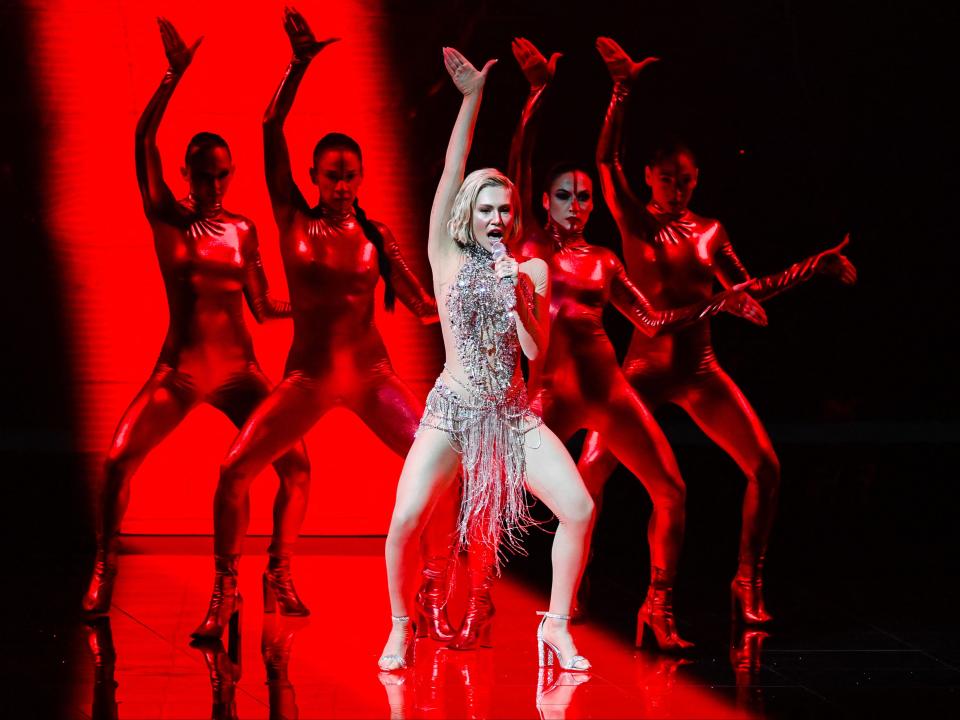Is America ready for its own Eurovision? Things could get messy

Call me Cassandra. For years, I, a citizen of France and therefore of the European Union, have been known to muse out loud: “What if the US had its own Eurovision Song Contest? But instead of countries voting for one another it were… all 50 states?” (Yes, I am fun at parties.)
On Friday, this concept came true. Eurovision organisers announced the creation of the American Song Contest, a Stateside version of the great European tradition. In case you’ve never heard of the Eurovision Song Contest, allow me to explain: it’s a song competition that has taken place every year (except 2020) since 1956 between European countries. Each country selects a singer or band to perform an original song, and votes for a winner. Now, here’s where it gets fun: countries obviously aren’t allowed to vote for themselves, and get instead to dish out their votes to others. (The votes are cast by a mix of viewers and industry professionals.) People get very excited, and occasionally very heated about the whole thing.
Perhaps even more important than the votes are the aesthetics of it all. Some Eurovision songs are absolute bangers (I remain partial to Bilal Hassani’s “Roi”, France’s 2019 entry); some of them, well, not so much. (The Independent rated Germany’s 2010 entry “Satellite” as the worst winning song ever.) The contest is reliably kitsch, and if you just embrace it, it’s great fun to watch.
I live in the US now, and am excited about the American Song Contest. OK, I have to say I don’t love the name. But as far as the concept goes, I’m willing to give it a chance. To recap: all 50 states, plus five US territories, plus Washington, DC, will all go head-to-head in the first US edition of the competition in 2022. “An incredible solo artist, duo, DJ or a band will represent each location performing an original song, celebrating the different styles and genres across America,” organisers have promised. One act will earn the Best Original Song distinction.
What a pitch! I have so many questions. For starters: do the acts have to be independent acts? Or is New Jersey allowed to send in, say, Bruce Springsteen? Can Tennessee pick Taylor Swift? Does Louisiana get to choose Britney Spears?
Most likely not. If the contest follows the European model, then the acts likely won’t be quite so well-known. But that’s part of the fun too! The beauty of the Eurovision Song Contest resides precisely in the fact that you never know quite what you’re in for until it’s too late, and all you can do is go along with whatever is happening onstage.
There is something so earnest about the Eurovision Song Contest. The costumes tend to be flashy, the songs are total wild cards, and the stage work is the opposite of subtle (I mean that in a good way). With that in mind, it does beg the question: how will the American Song Contest distinguish itself from other talent shows such as American Idol, Dancing With the Stars, or America’s Got Talent, which already tick most of the boxes mentioned above? Besides, many Americans have only vaguely heard of the Eurovision Song Contest, or not at all. In such a busy market (some might say saturated), the contest will have to work hard if it’s to last for more than one or two editions.
And then comes the matter of the votes. Assuming people won’t be able to vote for their home states (which, again, would reflect the European version), does that mean conservative states are going to all vote for one another, while progressive states do the same? Is this all going to devolve into an exhausting red-states-vs-blue-states standoff?
It’s not that I don’t want the contest itself to get political. That happens with Eurovision from time to time, and that’s par for the course. I’ve certainly never believed that celebrities should refrain from speaking out on politics and other important matters. The entertainment industry is a huge forum, and those with considerable platforms should use it wisely. So it’s not the competition itself that worries me, but rather the discourse that might end up surrounding it. Put it this way: we’re asking the US, a pretty divided country as it is, to settle on one collective song. Things could get messy.
It’s been an exhausting year. I’ve run out of patience for bad-faith controversies and false arguments. We didn’t get a Eurovision Song Contest in 2020 due to the coronavirus pandemic, so it’s only fair for us to be receiving a double ration in 2022. This is our chance at an over-the-top, whimsical, wonderfully chaotic extravaganza, and I so hope that’s what we receive. Should the American Song Contest be a mess, let it be a beautiful one.
Read More
The Independent visits Heathrow ahead of international travel restarting
The 16 moments that have defined David Byrne’s career: From Stop Making Sense to American Utopia

 Yahoo Movies
Yahoo Movies 